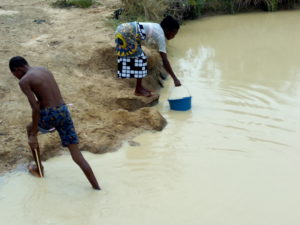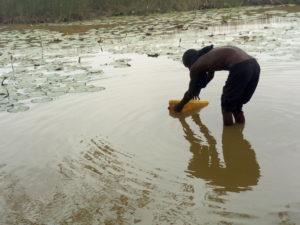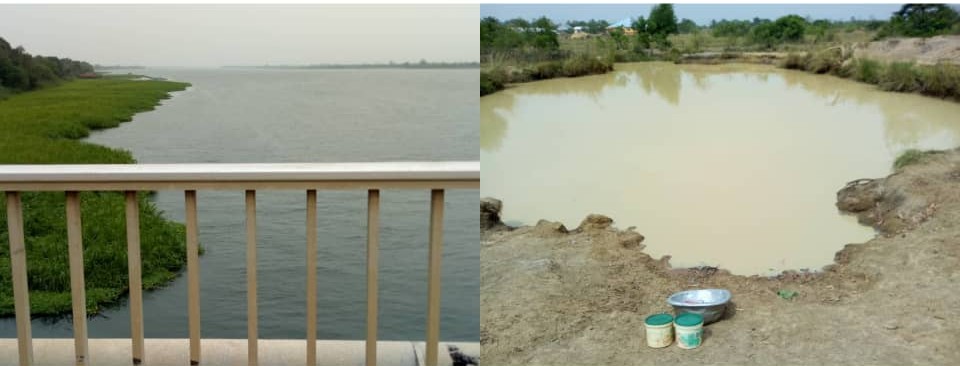By: Ewoenam Kpodo | Voltaonlinegh |
It is commonplace to see children of school going age and women carrying water. The children normally do this early in the morning to get water for household chores and for bath to go to school. They also go carrying water after school. The women also do this for same reasons and more except to go to school after bathing the water.
Children go with buckets, young men shoulder yellow plastic jerry cans (Kuffour gallons), while women, metal bowls balanced on their heads with support from cloth pads. In most cases, these people walk long distances with few, lucky enough to have the “golden water” source close to them.
While this may be a normal practice for most families in various communities including Ghana’s capital, Accra to collect treated water from roadside pumps and tanks, those in Tonguland go through the trouble just for dirty water. Appalling because of the name the people carry. Tongu.
It is needless to mention the effects of the lack of potable water on the education of these children and the health of residents in these areas.
Tongu Explained
Tonguland is made up of three districts; South, Central and North Tongu in the Volta Region of Ghana. In the north, it shares borders with Eastern Region at (North Tongu), in the south (South Tongu), Greater Accra Region. At the centre (Central Tongu), it links the other Tongu areas, and Anloga and Akatsi districts to the regional capital, Ho through Adaklu District.
Tongu is an Ewe language which means, around the river, or riverine community. The area abounds with water bodies, River Volta, and streams with prominent ones being Chinni, Todzi, Aklakpa and Gbaga to the extent that most of the communities can only be accessed through crossing over tributaries of River Volta.
The Irony
In an area which has plentiful natural water resources, a large part of its population still does not have access to clean water and some of the citizens spend their income purchasing water, (not the clean one unfortunately) from private sellers. It is purely the case of lack in the midst of plenty.
Many communities in the Tongu area including Dorkploame, Agorgbe, Feyito, Alorwukope, Dadome, Kpogede, Kanuwloe, Fakpoe, Lasivenu, Fedakope, Anawoekope and Dorfor-Avegame do not have water.
Assembly member for Mafi-Fiekpe Electoral Area, Central Tongu District, Jerry Davor said residents of two communities in his area, Sorkope and Fedakope (one having Gbaga Stream which dries up during the dry season, the other, muddy pond) suffered to get water adding, in both cases, the residents shared their water sources with animals which remained one major health concern for him.
Mr. Davor noted that few residents who could afford, travelled distances to other parts of the electoral area to buy potable water with the poor majority resigning to their fate because no respite was in sight.
At Kpotame, a community about 10 kilometres away from the South Tongu District capital, Sogakope, same problem persists despite Ghana Water Company Limited (GWCL) pipelines running through the town.
This has forced residents to resort to a nearby pond with dung of cows scattered all around requiring one to carefully look to avoid stepping on them, for water. Though the pond looks muddy on the surface, it reveals a dirty and brownish colour after it is scooped and stored in containers. Again, those who can afford, buy (but here) raw water from the Volta River from sellers in motorcycles.

A resident, Agnes Tofoh who gets water from this pond, said she sometimes used a chemical compound, potassium alum to purify the water for use and explained why she kept sharing water with cows and other animals.
“Buying water from these motorcycles is very expensive, one Kuffour gallon goes for GH¢1.00. Can you imagine how much I’ll spend in a day to take care of washing, cooking and other things for the family? To cut cost, the river water is only for drinking.”
Another resident, a nursing mother lamented the lack of potable water in the town and disclosed that she was at a point buying bags of treated water known as “pure water” from cars for her baby’s bath because both the water from the pond and the raw water from the motorcycles were causing irritation to the baby’s skin.
In a nearby community, Kasangblekpo, residents there get water from a dammed river, Kasangblekpo Dam. The dam has a greenish surface with lots of aquatic grasses on it.
A mother of five who gave her name only as Margaret said her children were always falling sick as a result of the water “which is contaminated with urine and faecal matter of animals” saying, on days she was not tired, she boiled the water before giving it to them.
According to her, she had no choice as she could not afford to buy the expensive river water (which is equally untreated).

The Agitation
While some communities which are quite a distance from the major water source, Volta River may consider the situation their fate and only continue to hope it one day changes, others refuse to understand the failure of the state to provide them with clean water.
Residents of Kpotame, some kilometers away from the South Tongu District capital, Sogakope which is home to the Lower Volta Bridge, and shares boundary with Tojeh in the Dangbe East District of the Greater Accra say they do not understand why they should have problem with water.
Chairman of a youth group in the area, Concerned Youth of Tefle-Kpotame, Sam Moses said they had made several attempts to fix the decade-long problem including visiting the District Chief Executive, Emmanuel Louis Agama and his predecessors, the Member of Parliament (MP), Korbla Mensah Woyome with fail. Same old stories of plans being underway.
The Chairman said the group once organised Water Festival aimed at raising money to address the problem but the money realised was woefully inadequate and so, getting to the 2016 general elections, they planned to boycott the elections.
“We strategically erected the ‘No Water, No Vote’ signboard so that the then President John Mahama will know about our resolve and act. Indeed, he came and saw the signboard while returning from one of his campaign trips from Ketu South and promised that he would fix it. Today, he is a former President and that is it.”
“What pains me is that they say we’re in the Volta Region named after River/Lake Volta and in Tongu, people around the water yet we thirst for water. It is my wish that they carve Kpotame and its surrounding communities without water, from Volta and add to Greater Accra because in neighbouring Tojeh, there is water,” he fumed.
An elderly man at Kasangblekpo known only as Ametsitsia had this to say. “We’ve never had potable water here. They (authorities) came and lied to us that they were bringing pipe-borne water to us. Because we wanted the process fast-tracked and serve government cost, we organised ourselves, dug the hole for the pipelines to be laid.”
He lamented, “but there was no show and the hole remained till it got filled up over time. We even asked for the dam to be dredged but that too, no.”
Paramount Chief of Tefle Traditional Area and acting Chairman of Tongu Chiefs, Togbe Nakakpo Dugbaza VIII wondered why successive governments had deprived it citizens of such a basic necessity, “water which is life” insisting, “there’s a water company governed by statutes to provide that.”
Interventions
There were interventions. Recently, Rotrary Club of Ho in partnership with Rotary Club of Manchester commissioned a water project to provide potable water for the people of Fievie Dugame and its environs in the South Tongu District.
Volta River Authority some time ago, handed over a solar-powered mechanised borehole project to communities of Amlalokorpe, Klukorpe and Afagbakorpe in the North Tongu District.
Community Water and Sanitation Agency (CWSA) established by Act of Parliament in 1998 to facilitate the provision of safe drinking water to rural communities, which has an office in Central Tongu capital, Adidome, had provided water to a number of communities in the district.
Attempts had been made by MP for North Tongu, Samuel Okudzeto Ablakwa to sink boreholes in some communities in his constituency but the water from the boreholes could not be used because of the high salt content. Similarly, former President Jerry John Rawlings sunk a borehole at Kpotame Health Centre but that too is salty and not being used.
A non-governmental organisation, International Needs, Ghana installed rain water harvesting system and a reservoir in one of the communities but just as long spell of dry season dries up streams, residents cannot always rely on this system.
The Despair
Manager, Ghana Water Company Limited, Sogakope District, Osman Safianu clarified the issue with the Kpotame water and said, it was not about the company not being able to treat the abundant water from the river and supply to the people for consumption but the problem was about the pipelines in the town.
Mr. Safianu said the 6-inch (instead of 12) transmission line from Agordome Treatment Plant to Sogakope and the 2-inch (instead of 4) distribution pipeline to Kpotame rendered the pressure too low to get water to the community.
Then Chief Manager, GWCL, Volta Region, Joseph A. Nkrumah in reaction, explained that the expansion of the pipelines delayed because central government could not release funds of over GH¢1 million for work to start saying, the region had submitted estimates for that project and others across Volta/Oti Region for attention.
Ing. Nkrumah during this year’s World Water Day in March, acknowledged the financial problem facing the company established with the mandate of production and distribution of potable water to customers in urban areas of the country, which has made it after 54 years on, “still struggling to realise this dream.”
This he said would pose “serious challenge if the country has to meet the Sustainable Development Goal 6 (SDG 6)” which is about clean water and sanitation by 2030.
Volta Regional Director, CWSA, Divine Dugbartey agreed with Mr. Nkrumah citing financial challenge as impeding the Agency’s work of getting clean water to rural dwellers concluding that “it’s been a sad story for us in the water sector.”
Solution in the pipeline
DCE for South Tongu, Emmanuel Louis Agama disclosed that the assembly was in talks with an Indian company into banana production in the area pumping water from the river to irrigate its farms, connect a pipeline to Kpotame so residents could at least access the raw water as a temporary measure.
Mr. Agama was hopeful that with the onset of Sogakope-Lome Trans-boundary Water Supply Project which processes he said government was working on to acquire land for the construction of a raw water intake facility at Sogakope and water treatment plant, issues with water in the district and other parts of the region would be addressed.
For now, all the hope is in this project. While it is a good thing to have hopes, it is also necessary to note that even plans for this project have remained in the pipeline since 1970 due to lack of funds and technical challenges with recent feasibility studies done in 2005 (Mr. Kuffour’s era) and in 2015 (Mr. Mahama’s era) under the auspices of African Development Bank.
Perhaps, there must be hope this time because President Nana Addo Dankwa Akufo-Addo in his keynote address on September 7, 2017 following his appointment by UN Secretary-General to co-chair his group of Eminent Advocates for the 2030 Agenda for Sustainable Development, reconfirmed his government’s commitment to localising the SDGs in the country stressing, they could not be achieved through “business as usual.” Perhaps.
Source: www.voltaonlinegh.com




